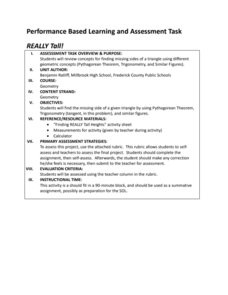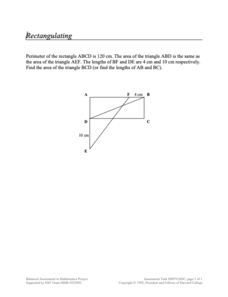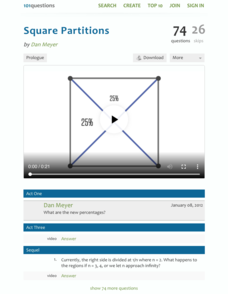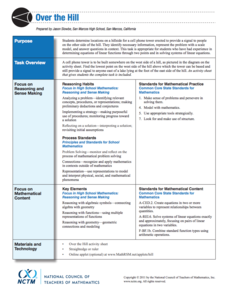Lane Community College
Review Sheets: Geometry
Full of problems with polygons, angles, lines, and triangles, your learners get a multi-page packet that provides all they need to know. It contains many of the standard problem types as well as some more challenging questions.
Mathematics Assessment Project
Identifying Similar Triangles
Math whizzes work with angle sums and exterior angles to figure out the measure of other angles. This particular publication provides comprehensive support in the form of an anticipatory activity, questions designed to prompt discussion,...
Flipped Math
Unit 6 Review: Similar Figures
After a short review of the material from the Similar Figures Unit, pupils work through 18 problems to further practice the skills from the unit. Scholars apply those skills in the application problems at the end of the review.
Flipped Math
Prove Triangles Similar
Show more than one way to prove similarity. Scholars learn three different methods to show two triangles are similar, Angle-Angle, Side-Side-Side, and Side-Angle-Side. Pupils practice applying these methods to determine whether two given...
Flipped Math
Similar Figures
Use some similar problems to find side lengths. Pupils learn the definition of similar figures and how it relates to corresponding angles and sides. Using the definition, individuals calculate the lengths of missing sides and practice...
Flipped Math
Intro to Trigonometry
Expand trigonometric ratios beyond right triangles. Pupils start with a review of trigonometric ratios and then take a look at angles in standard position to determine their measurements. Scholars discover how to find coterminal angles...
Las Cumbres Observatory
The Cosmic Distance Ladder: Parallax
Scientists don't have a ruler long enough to measure to the stars, so they rely on math. Scholars learn to calculate the distance from Earth to a star using the parallax method. They use angle measures from different perspectives to...
Radford University
A Day at the Beach!
Make math class feel like a day at the beach (minus all the sunburns, of course). Given information about a pail, a soup can, and a plastic pyramid mold, pupils calculate the volume of sand that can fit in each. They then design sand...
Radford University
REALLY Tall!
Conduct indirect measurements three ways. Working in groups, pupils come up with different ways to measure three tall objects indirectly. The teacher provides measurement information requested by the teams, and learners then calculate...
Radford University
How Tall is the Tree?
Pairs or small groups work together to determine the height of a tree using similar triangles. Learners make a judgement which direction to let a tree fall to avoid hitting any structures. They then write letters to the principal...
Radford University
Ramp It Up
Pupils gather measurements of real-world objects that have slopes. They then plot the measurements and find an equation of a line that fits the measurements. Finally, groups investigate the ADA and determine whether different ramps meet...
Radford University
2 and 3 Dimensional Shapes
Take a similar approach to three dimensions. Pupils develop the relationship between areas of similar objects and see how they relate to the ratio of the sides. Building upon area formulas, small groups put together volume formulas for...
Concord Consortium
Rectangulating
Use rectangles to find distances. Given a rectangle and three associated triangles, pupils determine the area of the triangles. Scholars know the three triangles have equal areas along with the perimeter of the rectangle and two other...
Concord Consortium
Proportional Representation
Sometimes the solution is all a matter of perspective. The short assessment task presents a problem to pupils that requires them to make sense of a diagram. Once learners see two similar triangles, the rest of the solution is solving a...
Mathed Up!
Similar Shapes
Similar shapes are all about the scale. Given seven problems, pupils use scale factors to determine measurements within similar shapes. While solving the problem, scholars also determine whether two figures are similar and use area and...
101 Questions
Square Partitions
Challenge your classes while developing their problem-solving skills. A square is divided neatly into four equal triangles by its diagonals until one diagonal is moved from a vertex to the midpoint of one side. Now, scholars must devise...
National Council of Teachers of Mathematics
Over the Hill
Can you hear me from there? Pupils determine the place to build a cell tower on a hill. The class uses constraints and creates a scale drawing on a coordinate system to calculate the exact location of the base of the cell tower.
National Council of Teachers of Mathematics
Bank Shot
Bank on geometry to line up the shot. The resource asks the class to determine the location to bank a cue ball in a game of billiards. Using their knowledge, class members determine where to hit the bumper to make a shot and discuss...
GeoGebra
Triangle Dilations
Stretch the class' knowledge of dilations. With the aid of the rubber band stretcher tool, learners perform dilations. They dilate the triangle by a whole number scale and a fractional scale from two centers of dilation.
Education Development Center
Similar Triangles
Model geometric concepts through a hands-on approach. Learners apply similar triangle relationships to solve for an unknown side length. Before they find the solution, they describe the transformation to help identify corresponding sides.
Virginia Department of Education
Similar Figures
How similar do figures have to be to be similar figures? Individuals learn to identify similar figures by verifying that angles are congruent and sides are proportional. Additionally, they match the corresponding parts of similar figures.
Virginia Department of Education
Similar Triangles
Pupils work in pairs to investigate what it takes to prove that two triangles are similar. They work through various shortcuts to find which are enough to show a similarity relationship between the triangles. Small groups work with the...
EngageNY
Pythagorean Theorem, Revisited
Transform your pupils into mathematicians as they learn to prove the popular Pythagorean Theorem. The 16th lesson in the series of 25 continues by teaching learners how to develop a proof. It shows how to prove the Pythagorean Theorem...
Mathematics Assessment Project
Modeling Motion: Rolling Cups
Connect the size of a rolling cup to the size of circle it makes. Pupils view videos of cups of different sizes rolling in a circle. Using the videos and additional data, they attempt to determine a relationship between cup measurements...

























